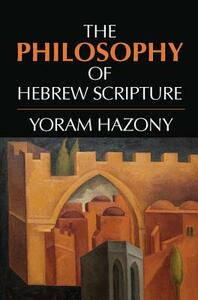Take a photo of a barcode or cover
I found Hazony's basic premise, that applying a philosopy-based reading to the Hebrew scriptures as opposed to just a revelation-based reading, was one I found to be sound. I really enjoyed reading how this could be applied and how it could change one's perception of what they were reading. I would argue that what we're really getting at is a religious philosophy since it is so hard to separate Judaism from any form of religion (and Hazony isn't attempting to state it should be separated from religion), so it's still not quite what I would generally think of as plain philosophy but it is fascinating and there are some great ideas and teachings to be found.
There's a definite slant to Hazony's book at times but for the most part this didn't get in the way of the book. Chapters 4-6 were the most interesting to me. I had never thought of of the shepherd-farmer dynamic before; it's definitely something that leaves you thinking. I also liked the exploration of names and language throughout the book such as Jacob becoming Israel, Moses's attempts at learning God's "name," and what this actually implies. The linguistics exploration was one of my favorite aspects and I would love to research this a lot more.
There are definitely some things I didn't agree with, some things with the author but others simply with the scriptures themselves (or at least this particular interpretation?) but that didn't get in the way of what was a very well researched book and I enjoyed reading it.
There's a definite slant to Hazony's book at times but for the most part this didn't get in the way of the book. Chapters 4-6 were the most interesting to me. I had never thought of of the shepherd-farmer dynamic before; it's definitely something that leaves you thinking. I also liked the exploration of names and language throughout the book such as Jacob becoming Israel, Moses's attempts at learning God's "name," and what this actually implies. The linguistics exploration was one of my favorite aspects and I would love to research this a lot more.
There are definitely some things I didn't agree with, some things with the author but others simply with the scriptures themselves (or at least this particular interpretation?) but that didn't get in the way of what was a very well researched book and I enjoyed reading it.

